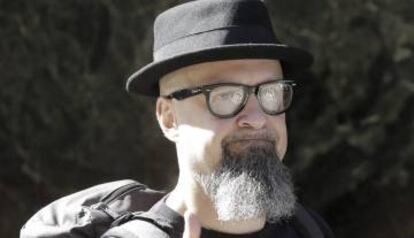Free speech in the Twitter era: no laughing matter in Spain
Experts disagree on where to draw the line to fight incitement to hatred without hurting civil liberties

A one-year jail sentence (which was suspended) and seven yearsˇŻ disqualification from holding a public position was the punishment meted out to 21-year-old Spanish college student Cassandra Vera, who tweeted jokes about the 1973 ETA bombing that killed Luis Carrero Blanco, a Spanish Admiral who served as prime minister toward the end of the Franco dictatorship. By the end of March, the Cassandra case had triggered a fierce debate on the boundaries of humor, freedom of expression and the criminal code. The debate is familiar, but the framework ¨C the global forum of social media ¨C is still very new.
Just weeks before Cassandra Vera was sentenced, C¨¦sar Strawberry, the frontman for rap rock band Def con Dos, was nailed when he joked on Twitter about missing GRAPO ¨C a defunct Spanish anti-fascist militant group ¨C and how he would like to send King Felipe VI a ˇ°rosc¨®n-bomb,ˇ± alluding to a popular ring-shaped cake eaten on January 6, the Day of the Three Kings of Orient. According to the Audiencia Nacional, SpainˇŻs High Court, the tweets ˇ°were an incitement to hatredˇ± and ˇ°legitimized terrorism as a way of solving social conflict.ˇ±
There are more ˇ®glorifying terrorismˇŻ cases now than when ETA was active
Meanwhile, the issue of free speech also came up during a homophobic campaign carried out by the ultra-Catholic association Hazte O¨Şr, which used a bus to spread their message. Many in favor of punishing Strawberry defended Hazte O¨ŞrˇŻs constitutional right to free speech, while those against punishing Strawberry demanded the removal of the Hazte O¨Şr bus from the streets, arguing that its campaign was discriminatory and could cause irreparable psychological damage to homosexual and transgender children.

Despite the difference in the nature of these cases, all three raised the issue of how to tackle hatred, humiliation and disrespect without being disproportionate and arbitrary. EL PA?S talked to lawyers, academics and sociologists on where the line between free speech and crime should be drawn.
When does hatred become terrorism?
According to the Organization for Security and Cooperation in Europe (OSCE), hate crimes are crimes ˇ°motivated by prejudice.ˇ± In 2015, SpainˇŻs Popular Party (PP) government used this broad interpretation to reform two articles in its criminal code, extending its scope and stepping up punishments. Article 510 states that comments and behavior that directly or indirectly incite hatred, hostility, discrimination or violence against one or more individuals, or cause ˇ°disrespect and humiliation,ˇ± are a punishable offense. Homophobic and xenophobic acts and ideologically motivated attacks are also illegal. The judge who ordered the Hazte O¨Şr bus off the streets, for example, invoked article 510.

Alongside article 510 is article 578, created in 2000 when ETA was still active. Article 578 states that ˇ°praising terrorismˇ± and ˇ°humiliating its victimsˇ± are both punishable offenses. This is the article that Cassandra Vera and C¨¦sar Strawberry were convicted under.
Internet revolution
Both articles 510 and 578 were reformed to introduce the aggravating circumstance of an offense committed online, carrying a maximum penalty of four years in jail for hate crimes and three years for praising terrorism. And that opened up a new door just when a large section of the population, particularly youngsters, are literally pouring out their thoughts online.
All the legal experts consulted by EL PA?S highlighted the importance of analyzing the context ?to determine the real intention behind the suspicious comment, while agreeing that this is no easy task.
A joke or a crime?
While Spanish comedy act Tip and Coll made jokes about Carrero Blanco in the 1980s without any repercussions, todayˇŻs social networker is closely monitored. These tweeters are at the center of the debate on whether hate comments on social media should be a matter for the criminal courts. ˇ°How is it possible that C¨¦sar Strawberry and Cassandra Vera have been convicted for a joke I heard my uncle make when I was a boy?ˇ± asks Manuel Cancio, a professor of criminal law. ˇ°The only explanation is that something else is going on. Perhaps, since we no longer have ETA, we are making things up.ˇ±
But the magistrate Alejandra Fr¨Şas takes a hard line on the matter. ˇ°One thing is humor and another is making fun of someoneˇŻs suffering. We need to take on board the savage consequences of what is said on social media.ˇ±
Sources from the central High Court and prosecutor offices state that jokes in themselves are not being prosecuted as crimes, but that sometimes jokes are used to disguise what really amounts to praise for terrorism.
ˇ°We have returned to the era of the public square,ˇ± says Santiago Mu?oz Machado, a professor of law at the Complutense University of Madrid and member of the Royal Spanish Academy (RAE). ˇ°Internet has taken over the media; everyone can take advantage of the freedom that cyberspace offers. And that includes liars and bad guys.ˇ±
Teresa Freixes, a professor of constitutional law at BarcelonaˇŻs Autonomous University, adds that people should be aware that Twitter and Facebook are not toys. ˇ°ItˇŻs communication and it is subject to rules.ˇ±
The data
It is difficult to quantify hate crimes partly because they are dealt with in different courts across Spain, and partly because they come under different articles of the criminal code. A report produced by the Interior Ministry states that there were 1,238 investigations into such crimes in 2015, 61% of which involved either xenophobia or ideological motivation.
But investigations do not necessarily end up in court. This year, for example, the ProsecutorˇŻs Report mentions 84 cases still under investigation and 228 offenders who are being tried for hate and discrimination ¨C 61 of them under article 510. But, due to the lack of IT resources, reliable statistics are not available.

In the case of praise for terrorism, the data is centralized by the High Court and is more accessible. It shows 60 charges brought this year and 32 indictments resulting from these or previous criminal proceedings.
Of all these offenses, praising terrorism is the one that has proven most newsworthy and triggered the most controversy, perhaps because convictions have actually climbed since ETA went into decline. According to the database of the General Council of the Judiciary (CGPJ), between 2005 and 2011 the High Court handed down 13 convictions and 19 acquittals over praise for terrorism or humiliation of terrorism victims: In the last two years, by comparison, there have been 54 convictions, 51 of which involved social media comments, and 13 acquittals.
Arguments against: excessive and ineffective
Manuel Cancio, a professor of criminal law at MadridˇŻs Autonomous University, believes there is an excessive reliance on criminal proceedings. ˇ°It is disproportionate and ineffective,ˇ± he says. ˇ°The judicial route should only be taken when there is direct incitement to a specific act of violence. For example, when people are actually getting something together, not just spouting off. This business about ˇ®the climate of hostilityˇŻ that has been inserted into the criminal codeˇ What exactly is this climate, and how is it defined?ˇ±
Mu?oz Machado agrees. ˇ°It is not the same thing to say, ˇ®I would kill Trump because he is a foolˇŻ as actually planning to kill him. The difference between the two is the boundary between what is permissible and what is not,ˇ± he argues. ˇ°There are classes of offenses that were previously three lines long, and now their definition runs into three pages. These laws are designed to cover every eventuality but donˇŻt allow the judges to take into account the circumstances of each individual case.ˇ±
Both Mu?oz Machado and Manuel Cancio believe that the toxic atmosphere created on social networks should be dealt with by imposing administrative restraints such as fining the users, closing down chats, and banning the sharing of specific comments, or by applying civil law in cases of slander and libel.
ETA vs Jihad
Since January 2015, there have been 67 charges brought in Spain for praising terrorism or humiliating victims of terrorism, according to the General Council of the Judiciary. Despite the fact that reforms to the criminal code in 2015 were justified by the need to combat radicalization online, 49 of the 54 convictions were related to the glorification of ETA and only five to the glorification of Jihad ¨C although there were also four convictions for indoctrination. None of the offenders have been sent to prison as their sentences were almost all under two years, though they could do in the future if they reoffend.
M¨®nica Cornejo, an anthropology PhD at MadridˇŻs Complutense University, and Artemio Baigorri, a sociologist at the University of Extremadura, take a similar view. ˇ°This is not a criminal matter. It is one of self-regulation,ˇ± says Cornejo. ˇ°I believe authorities should limit their intervention to awareness and educational campaigns, so that in time the generations coming up will behave differently. If you take the judicial route, itˇŻs almost as if you are telling people what to think.ˇ±
Baigorri believes that if you applied the criminal code to everything that is said online, 20% of the Spanish population would be facing charges of one kind or another. ˇ°This is a knee-jerk response to the problem and it will calm down,ˇ± he says. ˇ°In the cases that have come to light recently involving Twitter, the problem is one of education. Education is the key. It is an adaptation process and it has just begun, and I believe the next generations will cease to behave as we are doing now. Until then, there is nothing for it but to put up with it and remain collected, as though we were watching a child grow. When it comes to the internet, it is as though society had been returned to its infancy.ˇ±
Arguments in favor: intolerance is poison
Taking the opposite view is Miguel ?ngel Aguilar, a prosecutor and coordinator for services dealing with crimes of hate and discrimination in the province of Barcelona. He believes that while we may focus on anecdotal cases, we are failing to take into account the poisonous effect of intolerance on society.
ˇ°You have to understand that some hate speech leads to crime and poses a threat to many sections of society,ˇ± he says. ˇ°When somebody makes xenophobic or homophobic comments, these can have real consequences for people. Often, during the investigation into an extremely violent crime, the suspectˇŻs computer or cellphone reveals that they had been looking up a lot of hate material. ItˇŻs important to put things in perspective and look at the circumstances of each case, but criminal proceedings are a vital tool in tackling speech that threatens our democratic coexistence and peopleˇŻs dignity.ˇ±
Freixes agrees. ˇ°Freedom of expression is not without its limits and never was,ˇ± she says. ˇ°The limits are what protects democracy.ˇ± Freixes does not believe the convictions of Cassandra Vera and Strawberry to be unconstitutional, although she does believe that in cases like these, it would be more appropriate and effective to impose alternatives to jail such as community service.
It is not the same thing to say ˇ®I would kill Trump because he is a foolˇŻ as actually planning to kill him
Santiago Mu?oz Machado, law professor
According to the magistrate Alejandra Fr¨Şas, who sits on the National Cybersecurity Council, ˇ°perhaps it would be effective to update laws such as the law against defamation, adapting it to the new internet reality. That way, we could resolve some offenses with an administrative rather than a criminal response. But the judicial route must remain available. Social networks canˇŻt be used as a vehicle for outrageous comments.ˇ±
Philosopher and academic Emilio Lled¨®, who has 50 years of teaching experience behind him, does not believe in criminal measures for this kind of offense, but says he is astounded by the comments he is told people make on social media ¨C which he doesnˇŻt use himself. ˇ°Ignorance and stupidity always end in violence,ˇ± he says. ˇ°Inciting hatred is a crime.ˇ±
English version by Heather Galloway.

